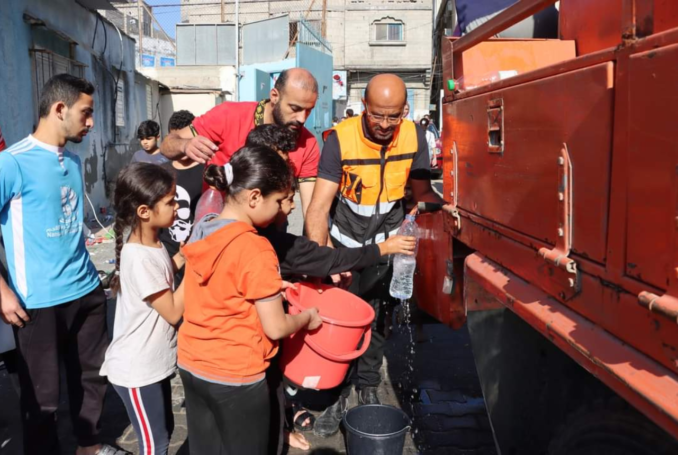Israel has halted the flow of water to the Gaza Strip, cutting off 70% of the territory’s supply. The shutdown, which began Saturday, affects a major pipeline operated by the Israeli water company Mekorot. The move has raised serious humanitarian concerns across the region.
According to Hosni Mehanna, spokesperson for Gaza’s municipality, the pipeline in Shujaiya, a neighborhood in eastern Gaza City, has stopped functioning. This area has been under intense military operation by Israeli forces since Thursday.
“We don’t yet know if the damage is from airstrikes or a political decision,” Mehanna said in a statement to Anadolu Agency. “But the consequences are dire. Gaza is now on the brink of a full-blown water crisis.”
Impact of Military Activity on Water Access
The pipeline in question supplies a significant portion of Gaza’s daily water needs. Without it, many residents, especially those in the north, are now depending on limited water truck deliveries.
“Even before the conflict, Gaza faced water shortages,” Mehanna explained. “Now, the situation is worse than ever.”
Gaza’s water infrastructure has already been weakened by years of conflict and blockade. Recent military actions have caused further damage, making repairs nearly impossible.
UNICEF Sounds the Alarm
The United Nations Children’s Fund (UNICEF) has warned that the current blockade is having a devastating effect on children.
“One million children are now at risk,” said Edouard Beigbeder, UNICEF’s Regional Director for the Middle East and North Africa. “We have thousands of pallets of aid ready to go, but they are stuck at the border.”
According to UNICEF, drinking water availability in Gaza has dropped sharply. Families used to have access to 16 liters of clean water per person each day. Now, that number has fallen to just six liters. If fuel shortages worsen, it may fall below four liters per day.
“This is not just a humanitarian issue,” Beigbeder emphasized. “Access to clean water is a legal right under international law.”
During the earlier ceasefire, UNICEF had begun repairing water wells and pipelines. However, the collapse of the truce has once again put those systems at risk.
Power Outages Add to the Crisis
Gaza’s southern desalination plant has reduced its output by 85% due to power cuts, further straining water supply systems. In the central and northern parts of the Strip, water pipelines have been damaged, and engineers cannot safely enter the area to fix them.
“Without power and fuel, we cannot treat or deliver safe drinking water,” a UNICEF official stated. “This increases the chance of disease outbreaks, especially among children.”
Humanitarian Aid Blocked
The current water crisis follows a broader policy shift by Israel. On March 1, Prime Minister Benjamin Netanyahu ordered a full blockade on humanitarian aid to Gaza. This includes food, fuel, and water.
“The international community must act now,” said a spokesperson for a coalition of aid groups. “Children are dying, and the world is watching.”
UN agencies have repeatedly called for the opening of humanitarian corridors to allow life-saving supplies into the enclave.
Continued Military Offensive
The blockade comes amid renewed military operations. On March 18, Israeli forces launched new airstrikes across Gaza, breaking a fragile ceasefire that had been in place since January 19. These attacks have led to hundreds of civilian deaths.
Since October 2023, over 50,000 Palestinians have been killed in Israeli operations, according to Palestinian health authorities. Most of the victims are reported to be women and children.
“The violence must end,” urged a UN Human Rights Council representative. “Gaza cannot survive much longer under these conditions.”
Legal and International Responses
In November 2024, the International Criminal Court (ICC) issued arrest warrants for Israeli Prime Minister Benjamin Netanyahu and former Defense Minister Yoav Gallant. They are accused of war crimes and crimes against humanity committed in Gaza.
In addition, the International Court of Justice (ICJ) is currently reviewing a case accusing Israel of genocide.
Despite growing global condemnation, the United States has continued to back Israel’s military campaign. Washington maintains that it was informed in advance of the operations and supports Israel’s right to self-defense.
A Region on the Brink
The current crisis is more than just a political or military issue. It is a humanitarian emergency that threatens the lives of millions, especially children.
“We urge all parties to respect international law and allow access to essential services,” UNICEF stated. “Water is life, and right now, Gaza is running dry.”

